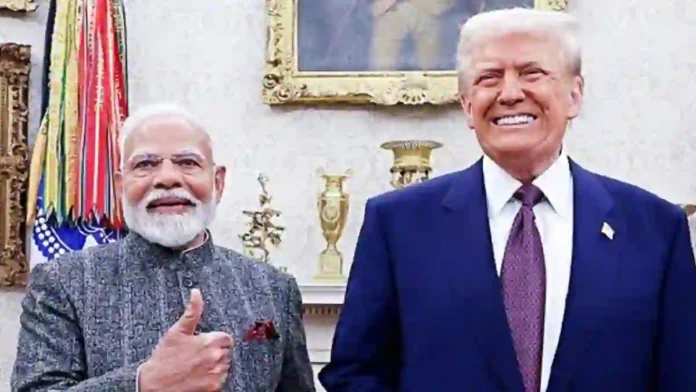Former US National Security Adviser John Bolton has bluntly stated that the once strong personal rapport between former President Donald Trump and Prime Minister Narendra Modi is now “gone,” highlighting a reversal in India–US ties that could have long-term strategic consequences. Bolton, who has consistently criticised Trump’s approach to governance and foreign policy, framed this shift as a broader lesson for world leaders—including UK Prime Minister Keir Starmer—that personal friendliness with Trump does not guarantee stability in bilateral relations.
His comments come at a sensitive moment, with India–US relations reportedly entering one of their most strained phases in over two decades, exacerbated by Trump’s protectionist tariffs, his administration’s repeated criticisms of New Delhi, and an increasingly transactional approach to diplomacy.
Read- Russia To Complete Delivery of Remaining S-400 Systems To India By 2026
Bolton underscored the risks of Trump’s style of foreign policy, which treats international relations as extensions of his personal ties with individual leaders. He noted that Trump often equates warm personal engagement with harmonious state-to-state relations—such as his dealings with Vladimir Putin—but warned that this outlook obscures structural realities of diplomacy.
For India, the loss of warmth in Trump–Modi ties has coincided with punitive trade measures, strained negotiations over tariffs and Russian oil imports, and pressure campaigns that have widened the rift between Washington and New Delhi.
Bolton described these policies as self-inflicted setbacks that undid years of bipartisan US efforts aimed at realigning India closer to the United States and distancing it from Cold War dependency on Russia.
The former NSA expressed concern that the Trump administration’s actions have inadvertently pushed India closer to the Moscow–Beijing axis. According to him, Beijing has actively positioned itself as a strategic alternative to Washington, attempting to capitalise on Indian frustration with the US.
This development runs counter to Washington’s long-term strategic logic of cementing India as a counterbalance to Chinese power in the Indo-Pacific. Bolton stressed that bipartisan efforts spanning Democratic and Republican administrations had succeeded in convincing Indian policymakers to treat China, rather than Pakistan or the West, as their principal security challenge.
Read- Trump Plots Revenge, ‘Begs’ Europe To Sanction India Over Russian Oil After ‘Epic Tariff Fail’
In his view, Trump’s policies, particularly sanctions threats and tariffs, risk reversing this strategic realignment at a critical juncture.
Bolton added that the reversal, though damaging, is not necessarily permanent and can be corrected under a more predictable US administration. However, he categorised the current moment as one of the most serious downturns in the bilateral relationship since the late 1990s, when India’s nuclear tests initially triggered sanctions and tensions.
He was particularly critical of Trump’s decision to penalise India for buying Russian oil—calling it an “unforced error”—arguing that it diminished New Delhi’s strategic autonomy while achieving little for American security goals. Trump’s policies, in Bolton’s narrative, reflect a short-term political calculus rather than a coherent long-term vision for the Indo-Pacific.
An added dimension to Bolton’s remarks is the timing of Trump’s upcoming UK visit from September 17–19, during which overseas leaders are weighing how to engage with him in his current phase of political resurgence.
Bolton cautioned that leaders like Starmer should absorb the lesson that a warm personal rapport with Trump is ultimately unreliable since it fails to shield partner nations from adverse policy shocks.
His social media commentary further amplified this, stating outright that the White House under Trump has “set US–India relations back decades” while simultaneously emboldening Beijing’s narrative as a credible alternative to Washington.
The political backdrop also casts a shadow on Bolton himself, who now faces his own legal troubles after FBI searches at his Maryland home and Washington office in connection with alleged mishandling of classified materials.
Nevertheless, his critique carries weight given his direct exposure to Trump’s decision-making as a senior official. His assessment underscores the fragility of personal diplomacy as a foundation for international engagement and the dangers of transactionalism in dealing with a strategic partner like India, where continuity and long-term trust have historically been essential to building alignment.
Bolton paints a picture of a bilateral relationship at a precarious point, where years of bipartisan investment have been jeopardised by short-term tariffs, sanctions pressures, and the collapse of Trump–Modi personal rapport.
For India, the result has been a narrowing of strategic options and renewed susceptibility to outreach from Russia and China. For the US, this marks a deterioration of one of its most strategically valuable partnerships in Asia at precisely the time when countering Chinese power projection requires trusted partners.
Bolton’s cautionary note serves both as an indictment of Trump’s foreign policy style and a warning to present and future leaders: personal warmth at the top is no substitute for sustained, structural alignment in state-to-state relations.
Based On PTI Report
Agency




